COOPERATIVE FOR THE PRODUCTION OF FILMS,
EXHIBITIONS
AND EVENTS INTO ARTISTS’ FILM, EXPERIMENTAL AND DOCUMENTARY CINEMA
LAIA is a co-op dedicated to culture, artistic and film production, as well as to freer forms of critical and collective thinking. In portuguese slang, laia is an expression often used to describe collective characteristics or behaviors that are looked down on or misunderstood. Nourished by such potency, which instigates renewed perspectives and production strategies, Laia aims to develop artistic and creative cooperation, through the exchange and sharing of knowledge. Laia is also a common name for silver, a pleasant material for us, given the inheritance of silver crystals in relation to film.
The co-op that emerges in the city of Porto is dedicated to the creation and production of artists’ and experimental films, the facilitation of artistic residencies, as well as exhibiting and programming in the fields of visual arts and experimental cinema. Laia has developed a film laboratory, Laboratório da Torre, specialized in analogue media — super8, 16mm and 35mm — while also incorporating technologies of video and digital photography. Being managed in a cooperative model and of public access, the artists-run lab is a space committed to foster creation within filmic experimental practices, as well as artistic collaboration, mutual support and access to analogue film equipment. Part of SPECTRAL, a project that connects six artists-run labs in europe, Laia co-op and the lab have been creating a platform for the development of E.C.A. — Expanded Cinematic Arts — in Portugal. Being funded in 2019 by Laetitia Morais, Mónica Baptista and Sofia Arriscado, current members of Laia co-op are Sofia Arriscado, Mónica Baptista and Rita Morais.
MEMBERS
SOFIA ARRISCADO
![]()
Studied Audiovisual Directing and Post-production in Lisbon and Philosophy in Porto. She works in the areas of documentary recording, video art and experimental cinema. collaboratesince 2006 with artists linked to the performing arts.She was camera operator and co-editor of the film Youth of Athens by Pauliana V.Pimentel and camera operator in the films After the Law and Echo of Jonathan's GutsUliel Saldanha.She was a member of the selection committee for the International Film Festival CompetitionPort/Post/Doc (2016-2018). Of her authorial work, “Fasma” (2017), “Lapso” (2021), co-authorcarried out with Costanza Givone, winner of the EDP/Maat Foundation Acquisition Prize at the 13th edition of FUSO - Lisbon International Video Art Festival (2021) and the Acquisition Prize - XXII Cerveira International Art Biennial (2022), and “Água Ardente” (2022), film installation co-authored with Laetitia Morais and Mónica Baptista. She is a member of the Torre Cinema Laboratory and co-founder of the cultural cooperative Laia, dedicated to the investigation and production of experimental cinema
SOFIA ARRISCADO
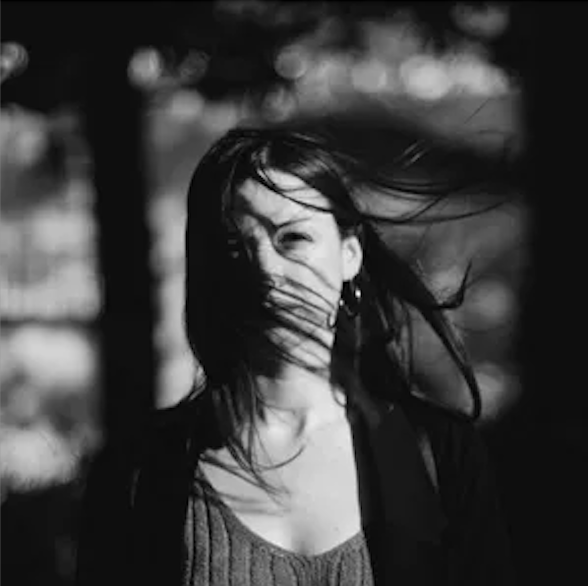
MÓNICA BAPTISTA
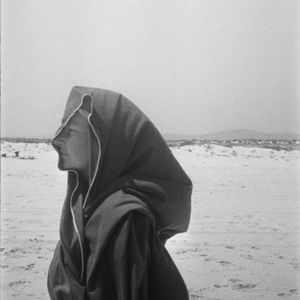

Graduated in Fine Arts-Painting from the Faculty of Fine Arts of Porto, develops work in the field of photography, video, documentary and experimental cinema, with a special focus on analogue media. Pitões das Júnias (Trás-os-Montes) has been a gestational place for the development of her work, as well as cyclical travel contexts and artistic residencies, among which, ZDB - Lisbon, Location One - New York, Crater Lab - Barcelona, Atelier 105 - Light Cone - Paris and LEC - Experimental Cine Laboratory in Mexico City. Her work has been shown in Portugal and internationally, in galleries and film festivals. Her filmography includes “Água Forte” (2018) premiered at the Vila do Conde Short Film Festival, with an honorable mention at Luso Brasileiro Festival and an acquisition award from the Porto City Council, “Cem Raios t'Abram” (co-directed, 2015), premiered at the Festival Vila do Conde Short Films (2014), “Diário” (2010) BES Revelação award - shown at the Serralves Museum and “Territórios” (2009) premiered at the Critics' Week (Cannes Festival) and winner of the Best Director award at the Visions du festival Reel (Switzerland).
RITA MORAIS

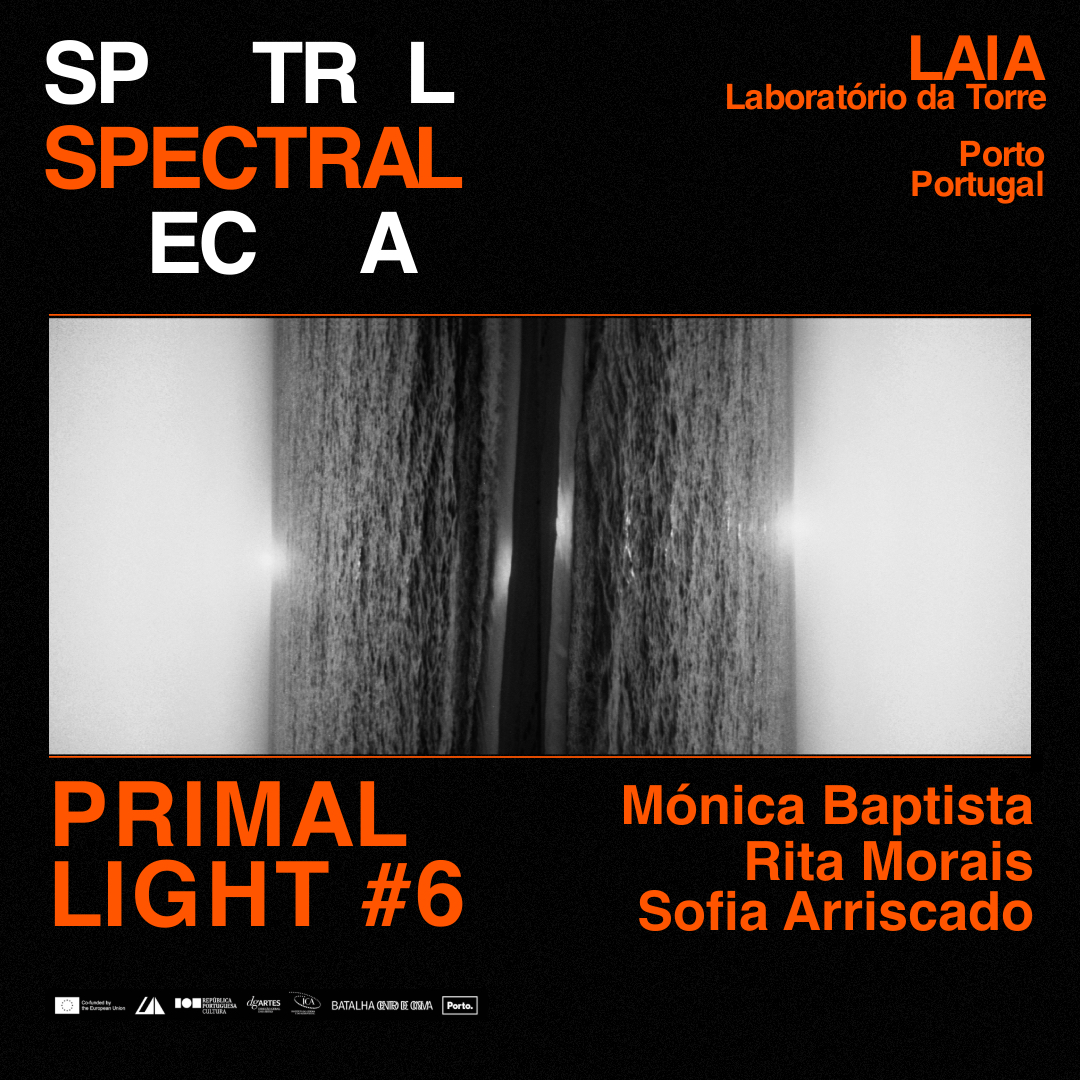
As residências Primal Light fazem parte do projeto SPECTRAL. Dedicadas à produção artística dentro da E. C. A. — Expanded Cinematic Art —, artistas são desafiados a interpretar o ambiente e o entorno como fonte de luz primordial, de tempo e de movimento.
Na Primavera de 2025, as artistas Mónica Baptista, Rita Morais e Sofia Arriscado, três membros da Cooperativa Laia, dedicam-se nesta residência a pensar o tema Primal Light.
Primal Light residencies are part of SPECTRAL project. Dedicated to artistic production within E.C.A. — Expanded Cinematic Art —, artists are challenged to interpret the environment as a source of primal light, time and motion.
In the spring of 2025, artists Mónica Baptista, Rita Morais e Sofia Arriscado, three members of Laia co-op, are in this artistic residency dedicated to think the theme of Primal Light.
Na Primavera de 2025, as artistas Mónica Baptista, Rita Morais e Sofia Arriscado, três membros da Cooperativa Laia, dedicam-se nesta residência a pensar o tema Primal Light.
Primal Light residencies are part of SPECTRAL project. Dedicated to artistic production within E.C.A. — Expanded Cinematic Art —, artists are challenged to interpret the environment as a source of primal light, time and motion.
In the spring of 2025, artists Mónica Baptista, Rita Morais e Sofia Arriscado, three members of Laia co-op, are in this artistic residency dedicated to think the theme of Primal Light.
Laia, palavra da gíria portuguesa frequentemente utilizada para descrever características e comportamentos colectivos menosprezados ou incompreendidos. O trabalho da cooperativa é nutrido por esta energia, instigadora de novas perspectivas e de estratégias de produção no domínio da cooperação cultural e da imagem em movimento.
Laia, a portuguese slang word often used to describe collective characteristics or behaviours that are looked down on or misunderstood. The co-op’s work is nourisehd by this energy, instigator of new perspectives and production strategies in cultural cooperation and moving image.
Laia, a portuguese slang word often used to describe collective characteristics or behaviours that are looked down on or misunderstood. The co-op’s work is nourisehd by this energy, instigator of new perspectives and production strategies in cultural cooperation and moving image.

No contexto do SPECTRAL são traçadas parcerias internacionais com o objectivo da circulação de obras E. C. A. — Expanded Cinematic Art — e do estreitamento da colaboração entre entidades que as produzem, exibem e distribuem. Em Junho de 2025, os laboratórios Mire e Laia-Torre juntam-se com o festival S8 — Mostra de Cinema Periférico, na Corunha, para a sessão Wandering Projection.
Com o programa Wandering Projection no S8, os dois Laboratórios propõem uma activação dos projectores portáteis de 16mm gerados no Mire (fáceis de transportar e auto-suficientes em electricidade) e passeios nocturnos pela Corunha, num programa construído como uma interpretação dos temas “Wandering” e “Primal Light” (explorados pelo Mire e pela Laia-Torre, respectivamente). Inclui filmes de Oskar Fischinger, Kurt Kren, Patrice Kirchhofer, Malena Szlam, Cécile Fontaine, Pedro Paiva e João Maria Gusmão, Gary Beydler e Charlotte Pryce.
Participam Mónica Baptista, Rita Morais e Sofia Arriscado da Laia-Torre e Pierre Signolat, Chloé Beulin e Aurélie Percevault, do Mire.
Within the context of SPECTRAL, international partnerships have been set up with the aim of circulating E.C.A. — Expanded Cinematic Art — works and strengthening collaboration between structures that produce, exhibit and distribute them. In June 2025, Mire and Laia-Torre labs join with the S8 - Mostra de Cinema Periférico festival in A Coruña for a Wandering Projection session.
With the Wandering Projection programme at S8 the two Labs propose an activation of the portable 16mm projectors generated at Mire (easy to transport and self-sufficiency in electricity) and night walks around A Coruña, in a programme put together as an interpretation of both “Wandering” and “Primal Light” themes (explored by Mire and Laia-Torre, respectively). It includes films by Oskar Fischinger, Kurt Kren, Patrice Kirchhofer, Malena Szlam, Cécile Fontaine, Pedro Paiva e João Maria Gusmão, Gary Beydler and Charlotte Pryce.
Participants are Mónica Baptista, Rita Morais and Sofia Arriscado from Laia-Torre + Pierre Signolat, Chloé Beulin and Aurélie Percevault, from Mire.
IMG. Mire wandering projection, FR, 2023
S8 — Mostra de Cinema Periférico é um festival na cidade da Corunha.
S8 International Peripheral Film Festival (Mostra de Cinema Periférico) is a festival held in the city of A Coruña.
S8 International Peripheral Film Festival (Mostra de Cinema Periférico) is a festival held in the city of A Coruña.

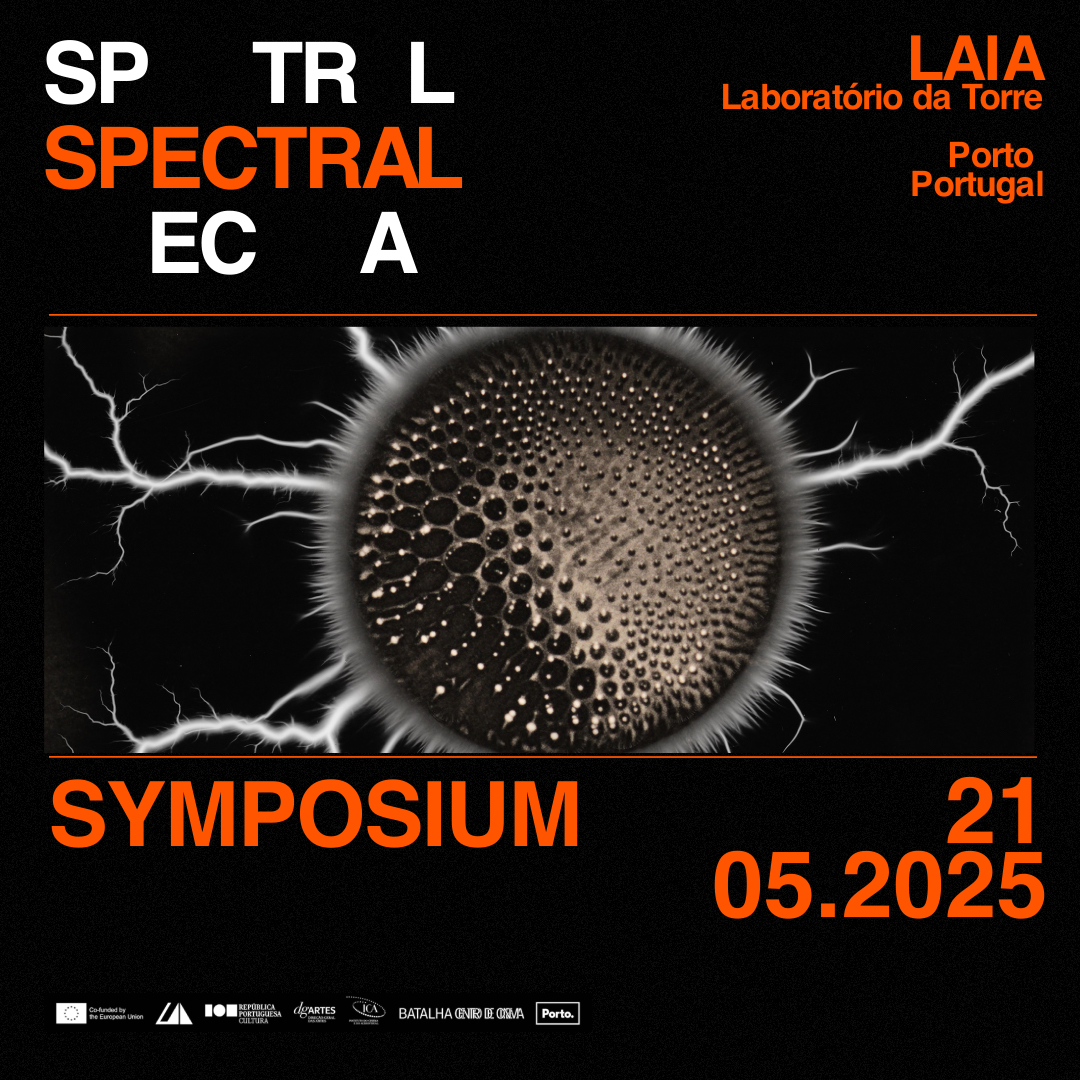
Symposium — animismo e arte cinemática expandida
O Symposium é um evento que se insere no âmbito do SPECTRAL, projeto desenvolvido em Portugal pela Cooperativa Laia e que coloca o espaço do Laboratório da Torre em diálogo com outros laboratórios de cinema analógico europeus geridos por artistas. Neste contexto, convidaram-se as investigadoras e programadoras Teresa Castro e May Adadol Ingawanij para apresentarem as suas investigações em torno do conceito de animismo, nas suas relações (e possíveis divergências) com as práticas do cinema experimental e da arte cinemática expandida. Ambas as conversas serão acompanhadas de um programa de filmes pensado por cada uma das convidadas.
Symposium is part of SPECTRAL, a project developed in Portugal by Laia co-op that puts Laboratório da Torre in dialogue with other analogue film labs run by artists in Europe. In this context, researchers and programme-makers Teresa Castro and May Adadol Ingawanij have been invited to present their research on the concept of animism and its relationships (and possible divergences) with the practices of experimental cinema and expanded cinematic arts. Both talks will be accompanied by a programme of films curated by each of the guests.
21/05 | 17:00 | Batalha Centro de Cinema — Bar
Apresentação das investigações de May Adadol Ingawanij e Teresa Castro
Entrada livre
21/05 | 19:15 | Batalha Centro de Cinema — Sala 2
Sessão de cinema + Conversa com Teresa Castro
Entrada gratuita, com levantamento de bilhete
21/05 | 21:15 | Batalha Centro de Cinema — Sala 2
Sessão de cinema + Conversa com May Adadol Ingawanij
Entrada gratuita, com levantamento de bilhete
Symposium — animism and expanded cinematic arts
21/05 | 17:00 | Batalha Film Center — Bar
Research presentations by May Adadol Ingawanij and Teresa Castro
Free entrance
21/05 | 19:15 | Batalha Centro de Cinema — Sala 2
Film screening + Talk with Teresa Castro
Free entrance upon ticket pick-up
21/05 | 21:15 | Batalha Centro de Cinema — Sala 2
Film screening + Talk with May Adadol Ingawanij
Free entrance upon ticket pick-up
“O cinema animista como arte da atenção”
Apresentação e sessão de filmes programada por Teresa Castro
Dum ponto de vista histórico, a expressão “cinema animista” evoca um conjunto de debates sobre as forças latentes ou manifestas das imagens cinematográficas, decorridos nos anos 1920-1950. Mas o que pode significar hoje o cinema animista? Apesar dos contributos incontornáveis da antropologia contemporânea para uma compreensão renovada do animismo, o cinema animista é aqui pensado em relação com a crise ecológica que atravessamos e a partir das propostas da filósofa e militante ecofeminista australiana Val Plumwood. Nos seus escritos, Plumwood defende um animismo filosófico que valoriza a matéria e nela reconhece formas de intencionalidade e de criatividade. Neste âmbito, algumas práticas características do cinema experimental são particularmente interessantes, sugerindo a ideia dum cinema animista como uma sensibilidade. Ou seja, como uma ética da atenção e do cuidado.
“Animist cinema as the art of attention”
Presentation and film screening programmed by Teresa Castro
From a historical point of view, the expression ‘animist cinema’ evokes a series of debates on the latent or manifest forces of cinematographic images that took place in the 1920s-1950s. But what can animist cinema mean today? Despite the unavoidable contributions of contemporary anthropology to a renewed understanding of animism, animist cinema is considered here in relation to the ecological crisis we are going through and based on the proposals of Australian philosopher and eco-feminist activist Val Plumwood. In her writings, Plumwood advocates a philosophical animism that values matter and recognises in it forms of intentionality and creativity. In this context, some practices characteristic of experimental cinema are particularly interesting, suggesting the idea of animist cinema as a sensibility. In other words, as an ethic of attention and care.
Programa da sessão 19h15 // Screening programme 19h15
Charlotte Pryce, “Pwdre ser the rot of stars”, 16 mm, cor, sonoro, 2019, 6’35 min.
John N. Campbell, “Li: the Patterns of Nature”, 16 mm, cor, sonoro, 2007, 9’07 min.
Elke Marhöfer, “Becoming Extinct: Wild Grass”, 16mm, cor, sonoro, 2017, 23 min.
Rita Morais, “Há ouro em todo o lado”, 16 mm, cor, sonoro, 2023, 12’30 min.
~~~
“Animistic Apparatus”
Apresentação e sessão de filmes programada por May Adadol Ingawanij
A conversa baseia-se na experiência da oradora no desenvolvimento de um projeto de investigação curatorial experimental com diversos colaboradores. “Animistic Apparatus” (2018 - ) concebe um método curatorial para explorar ecologias de relações que entrelaçam práticas cinematográficas e cosmológicas com múltiplos seres agenciais em mundos de poderes e potências assimétricos. O desenvolvimento do projeto implicou, em parte, a re-situação da questão fundamental da teoria do cinema: o que é o cinema? O projeto reaprende a curadoria de imagens em movimento inspirando-se numa genealogia cinematográfica e cosmológica animista da cultura cinematográfica na Tailândia: a prática da projeção de filmes ao ar livre como esforço ritualístico em ecologias espirituais de pessoas em circunstâncias precárias para criar tempo, perspectivas futuras e relações com poderes opacos.
“Animistic Apparatus”
Presentation and film screening programmed by May Adadol Ingawanij
My talk draws on my experience of developing an experimental curatorial research project with wide-ranging collaborators. Animistic Apparatus (2018 - ) devises a curatorial method to explore ecologies of relations intertwining cinematic and cosmological practices with multiple agential beings in worlds of asymmetric powers and potency. The project’s unfolding partly entailed re-situating film theory’s foundational question: what is cinema? It relearns moving image curation by drawing inspiration from an animistic cinematic and cosmological genealogy of film culture in Thailand: the practice of outdoor film projection as ritualistic efforts in spirit ecologies of people in precarious circumstances to make time, future prospect, and relations with opaque powers.
Programa da sessão 21h15 // Screening programme 21h15
Migrant Ecologies Projects, “{if your bait can sing the wild one will come} Like Shadows Through Leaves” , 2021, 28mins
Sasithorn Ariyavicha, “Birth of the Seanéma”, 2004, 70mins
*IMG.Pwdre ser the rot of stars, Charlotte Pryce

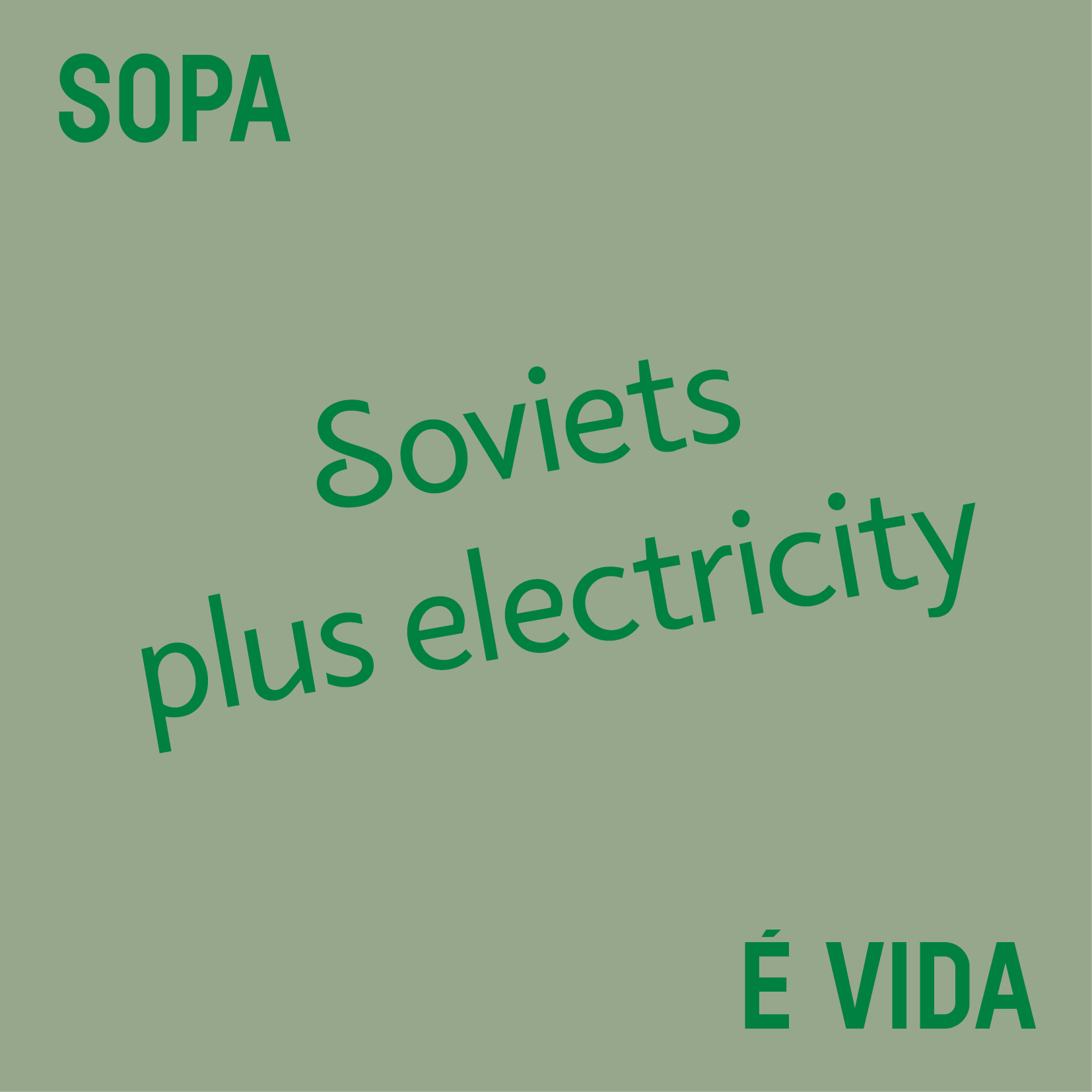
06.05.2025 | 19h00h
rua dos mercadores, 136 — porto
entrada livre // free entrance
sopa com contribuição // soup with contribution
a sopa é servida às 19h, devido à duração da sessão | soup is served from 7pm onwards due to the projection duration.
A Sopa é Vida de Maio recebe Nicolas Rey, de passagem pela cidade do Porto, exibindo um dos seus filmes, Soviets plus electricity (”Les soviets plus l’électricité”). A obra exibida em 16mm e projectada pelo autor.
Esta sessão foi proposta por Leonor Guerra em diálogo com a Laia e a sopa é cozinhada por Odair Monteiro, ambos membros do Laboratório da Torre
May’s Sopa é Vida welcomes Nicolas Rey, passing by Porto, and exhibites one of his films, Soviets plus electricity (”Les soviets plus l’électricité”). The film is exhibited in 16mm and projection is made by the author.
This screening was proposed by Leonor Guerra in dialogue with Laia and soup is cooked by Odair Monteiro, both members of Laboratório da Torre.
Programa//Programme:
Soviets plus electricity (”Les soviets plus l’électricité”), de Nicolas Rey
Uma viagem cinematográfica pela Rússia até Magadan, cidade famosa nos tempos soviéticos por albergar um campo de trabalhos forçados, na qual o realizador utiliza excertos do seu diário áudio e imagens de filmes antigos, em busca de raízes imaginárias e de implicações políticas.
A cinematic journey through Russia to Magadan, a city famous in Soviet times for housing a labor camp, in which the director uses excerpts from his audio diary and old film footage, in search for imaginary roots and political implications.
Duração//Duration: 2h55min
rua dos mercadores, 136 — porto
entrada livre // free entrance
sopa com contribuição // soup with contribution
a sopa é servida às 19h, devido à duração da sessão | soup is served from 7pm onwards due to the projection duration.
A Sopa é Vida de Maio recebe Nicolas Rey, de passagem pela cidade do Porto, exibindo um dos seus filmes, Soviets plus electricity (”Les soviets plus l’électricité”). A obra exibida em 16mm e projectada pelo autor.
Esta sessão foi proposta por Leonor Guerra em diálogo com a Laia e a sopa é cozinhada por Odair Monteiro, ambos membros do Laboratório da Torre
May’s Sopa é Vida welcomes Nicolas Rey, passing by Porto, and exhibites one of his films, Soviets plus electricity (”Les soviets plus l’électricité”). The film is exhibited in 16mm and projection is made by the author.
This screening was proposed by Leonor Guerra in dialogue with Laia and soup is cooked by Odair Monteiro, both members of Laboratório da Torre.
Programa//Programme:
Soviets plus electricity (”Les soviets plus l’électricité”), de Nicolas Rey
Uma viagem cinematográfica pela Rússia até Magadan, cidade famosa nos tempos soviéticos por albergar um campo de trabalhos forçados, na qual o realizador utiliza excertos do seu diário áudio e imagens de filmes antigos, em busca de raízes imaginárias e de implicações políticas.
A cinematic journey through Russia to Magadan, a city famous in Soviet times for housing a labor camp, in which the director uses excerpts from his audio diary and old film footage, in search for imaginary roots and political implications.
Duração//Duration: 2h55min
Nicolas Rey, nasce em França em 1968. Não foi nomeado a propósito do famoso realizador americano (esse sim tinha um pseudónimo), nem tão-pouco é filho do cineasta experimental francês Georges Rey. Faz filmes desde 1993, produções que se situam algures entre a fotografia, o documentário e o cinema experimental. Passa a maior parte do seu tempo no “L'Abominable”, um laboratório analógico gerido por artistas que ajudou a fundar em 1995.
~~
Nicolas Rey, was born in France in 1968. He wasn’t named after the famous American director (he’s the one that had a pseudonym) and he’s not even the son of the French experimental filmmaker Georges Rey. He’s been making films since 1993, productions hovering somewhere between photography, documentaries and experimental films. He spends most of his time at “L'Abominable”, an artist film lab he helped found in 1995.
~~
Nicolas Rey, was born in France in 1968. He wasn’t named after the famous American director (he’s the one that had a pseudonym) and he’s not even the son of the French experimental filmmaker Georges Rey. He’s been making films since 1993, productions hovering somewhere between photography, documentaries and experimental films. He spends most of his time at “L'Abominable”, an artist film lab he helped found in 1995.


22.04.2025 | 19h30h
rua dos mercadores, 136 — porto
entrada livre // free entrance
sopa com contribuição // soup with contribution
A Sopa é Vida de Abril propõe uma sessão angariação de fundos para a Palestina, bem como uma conversa aberta à comunidade. Todas as contribuições e donativos serão entregues ao Palestine Children’s Relief Fund.
April’s Sopa é Vida proposes a film screening fundrasing for Palestine, as much as an open conversation with the community. All funds and donations will be directed to Palestine Children’s Relief Fund.
Programa//Programme:
A FIDAI FILM, de Kamal Aljafari
No verão de 1982, o exército israelita invadiu Beirute e apreendeu os arquivos do Centro de Investigação Palestiniano. Os arquivos continham muitos documentos históricos sobre a Palestina, incluindo uma rica coleção de fotografias e filmes. Desde então, as imagens foram renomeadas e reindexadas de acordo com a visão dos seus novos possuidores, o Ministério da Defesa de Israel. Contra tais actos de espoliação e apropriação (uma sequência mostra a violência silenciosa dos seus autores), A Fidai Film oferece uma contra-narrativa baseada nessa perda, de forma a restaurar os vestígios da história palestiniana saqueada. Kamal Aljafari reexamina estas imagens, aqui exclusivamente cinematográficas ou televisuais, e aponta para a complexidade do seu estatuto, bem como para o seu modo de existência como objeto político. Desenrola-se um duplomovimento, o de fazer ressurgir estas imagens, por vezes testemunhos preciosos que restauram a vida e as lutas do povo palestiniano, mas também o de repensar o olhar implícito de quem as produziu (o gesto colonial). Kamal Aljafari molda-os, por vezes maltrata-os, para fazer sobressair a ideologia subjacente, o olhar exotizador e os gestos de espoliação: riscando os comentários dos vencedores e ocupantes (desde o mandato britânico até hoje), acrescentando, colorindo, removendo textos sobrepostos, modificando sons, recombinando, editando. Um gesto de raiva e luta em ação, tanto quanto uma restituição de uma memória distorcida ou apagada, A Fidai Film afirma ser uma forma de sabotagem cinematográfica, um filme combativo, como o título inequivocamente indica. (Nicolas Feodoroff—FID)
In the summer of 1982, the Israeli army invaded Beirut and took advantage of the opportunity to seize the archives of the Palestinian Research Center. These archives contained many historical documents on Palestine, including a rich collection of photographs and films. These images have since been renamed and re-indexed according to the vision of their new custodians, the Israeli Ministry of Defense. Against these acts of dispossession and appropriation (one sequence shows the quiet violence of their authors), A Fidai Film offers a counter-narrative based on this loss, in order to restore the traces of the plundered Palestinian history. Kamal Aljafari re-examines these images, here exclusively cinematographic or televisual, and points out the complexity of their status as well as their mode of existence as a political object. A double movement unfolds, that of making these images resurface, sometimes precious testimonies restoring the life, the struggles of the Palestinian people, but also that of rethinking the implicit gaze of those who produced them (the colonial gesture). Kamal Aljafari kneads them, sometimes mistreats them, in order to bring out the underlying ideology, the exoticizing gaze as well as the gestures of dispossession: crossing out the comments of the victors and occupiers (from the British mandate to today), adding, colorizing, removing superimposed texts, modifying sounds, recombining, editing. A gesture of anger and struggle in action as much as a restitution of a distorted or erased memory, A Fidai Film claims to be a form of cinematographic sabotage, a combative film as the title unequivocally indicates. (Nicolas Feodoroff—FID)
Duração//Duration: 78min
rua dos mercadores, 136 — porto
entrada livre // free entrance
sopa com contribuição // soup with contribution
A Sopa é Vida de Abril propõe uma sessão angariação de fundos para a Palestina, bem como uma conversa aberta à comunidade. Todas as contribuições e donativos serão entregues ao Palestine Children’s Relief Fund.
April’s Sopa é Vida proposes a film screening fundrasing for Palestine, as much as an open conversation with the community. All funds and donations will be directed to Palestine Children’s Relief Fund.
Programa//Programme:
A FIDAI FILM, de Kamal Aljafari
No verão de 1982, o exército israelita invadiu Beirute e apreendeu os arquivos do Centro de Investigação Palestiniano. Os arquivos continham muitos documentos históricos sobre a Palestina, incluindo uma rica coleção de fotografias e filmes. Desde então, as imagens foram renomeadas e reindexadas de acordo com a visão dos seus novos possuidores, o Ministério da Defesa de Israel. Contra tais actos de espoliação e apropriação (uma sequência mostra a violência silenciosa dos seus autores), A Fidai Film oferece uma contra-narrativa baseada nessa perda, de forma a restaurar os vestígios da história palestiniana saqueada. Kamal Aljafari reexamina estas imagens, aqui exclusivamente cinematográficas ou televisuais, e aponta para a complexidade do seu estatuto, bem como para o seu modo de existência como objeto político. Desenrola-se um duplomovimento, o de fazer ressurgir estas imagens, por vezes testemunhos preciosos que restauram a vida e as lutas do povo palestiniano, mas também o de repensar o olhar implícito de quem as produziu (o gesto colonial). Kamal Aljafari molda-os, por vezes maltrata-os, para fazer sobressair a ideologia subjacente, o olhar exotizador e os gestos de espoliação: riscando os comentários dos vencedores e ocupantes (desde o mandato britânico até hoje), acrescentando, colorindo, removendo textos sobrepostos, modificando sons, recombinando, editando. Um gesto de raiva e luta em ação, tanto quanto uma restituição de uma memória distorcida ou apagada, A Fidai Film afirma ser uma forma de sabotagem cinematográfica, um filme combativo, como o título inequivocamente indica. (Nicolas Feodoroff—FID)
In the summer of 1982, the Israeli army invaded Beirut and took advantage of the opportunity to seize the archives of the Palestinian Research Center. These archives contained many historical documents on Palestine, including a rich collection of photographs and films. These images have since been renamed and re-indexed according to the vision of their new custodians, the Israeli Ministry of Defense. Against these acts of dispossession and appropriation (one sequence shows the quiet violence of their authors), A Fidai Film offers a counter-narrative based on this loss, in order to restore the traces of the plundered Palestinian history. Kamal Aljafari re-examines these images, here exclusively cinematographic or televisual, and points out the complexity of their status as well as their mode of existence as a political object. A double movement unfolds, that of making these images resurface, sometimes precious testimonies restoring the life, the struggles of the Palestinian people, but also that of rethinking the implicit gaze of those who produced them (the colonial gesture). Kamal Aljafari kneads them, sometimes mistreats them, in order to bring out the underlying ideology, the exoticizing gaze as well as the gestures of dispossession: crossing out the comments of the victors and occupiers (from the British mandate to today), adding, colorizing, removing superimposed texts, modifying sounds, recombining, editing. A gesture of anger and struggle in action as much as a restitution of a distorted or erased memory, A Fidai Film claims to be a form of cinematographic sabotage, a combative film as the title unequivocally indicates. (Nicolas Feodoroff—FID)
Duração//Duration: 78min
Iniciada há quase duas décadas, a obra do realizador palestiniano Kamal Aljafari (nascido na cidade de Ramla, Palestina, em 1972) tem inquirido as dimensões éticas e estéticas subjacentes à imagem filmada a partir da sua história pessoal e do contexto político envolvente. Um cinema feito em modo de resistência, revelando invisibilizações e jogos de poder através de uma abordagem que cruza a ficção, o documentário, o ensaio visual e a found footage. Até que ponto a materialidade real e figurada de uma imagem pode tornar-se uma abstração ou um espectro? Se o cinema de Aljafari parte da observação de um quotidiano que não só coexiste como habita a própria ruína, ele transforma depois essas imagens em rastos, ecos, manchas, borrões e, nos seus filmes mais radicais e recentes, em pixéis não capturáveis pelas noções de real. A arte de transformar a materialidade angustiante das paredes partidas e dos terraços destruídos de um território invadido numa imaterialidade desencarnada é a arte de reconfigurar a Palestina que, através de imagens em movimento, acaba por ultrapassar as forças que aprisionam e destroem esse espaço. Por entre fragmentos de memórias e imagens de um povo assolado pelo apagamento, o cinema de Kamal Aljafari apresenta capítulos de uma história inacabada, simultaneamente pessoal e comunitária. Os filmes de Aljafari foram exibidos em numerosos festivais, incluindo Locarno, Torino, TIFF, Rotterdam, Fidmarseille, tal como em museus como Tate Modern ou MoMa.
~~
Begun almost two decades ago, the work of the Palestinian director Kamal Aljafari (born in the city of Ramla, Palestine, in 1972) has inquired into the ethical and aesthetic dimensions underlying the filmed image from his personal story and the surrounding political context. A cinema made in resistance mode, revealing invisibilities and power games through an approach that crosses between fiction, documentary, visual essay and found footage. To what extent can the real and figurative materiality of an image become an abstraction or a spectre? If Aljafari's cinema starts from the observation of an everyday life that not only coexists but inhabits its own ruin, he then transforms these images into traces, echoes, stains, blurs and, in his most recent films, into pixels that cannot be captured by notions of real. The art of transforming the harrowing materiality of the broken walls and destroyed terraces of an overrun territory into a disembodied immateriality is the art of reconfiguring Palestine that, through moving images, eventually transcends the forces that imprison and destroy that space. Amid fragments of memories and images of a people ravaged by erasure, Kamal Aljafari's cinema presents chapters of an unfinished story, simultaneously personal and communal. Aljafari’s films have been screened in numerous film festivals including Locarno, Torino, TIFF, Rotterdam, Fidmarseille as well as museums including Tate Modern and MoMa.
~~
Begun almost two decades ago, the work of the Palestinian director Kamal Aljafari (born in the city of Ramla, Palestine, in 1972) has inquired into the ethical and aesthetic dimensions underlying the filmed image from his personal story and the surrounding political context. A cinema made in resistance mode, revealing invisibilities and power games through an approach that crosses between fiction, documentary, visual essay and found footage. To what extent can the real and figurative materiality of an image become an abstraction or a spectre? If Aljafari's cinema starts from the observation of an everyday life that not only coexists but inhabits its own ruin, he then transforms these images into traces, echoes, stains, blurs and, in his most recent films, into pixels that cannot be captured by notions of real. The art of transforming the harrowing materiality of the broken walls and destroyed terraces of an overrun territory into a disembodied immateriality is the art of reconfiguring Palestine that, through moving images, eventually transcends the forces that imprison and destroy that space. Amid fragments of memories and images of a people ravaged by erasure, Kamal Aljafari's cinema presents chapters of an unfinished story, simultaneously personal and communal. Aljafari’s films have been screened in numerous film festivals including Locarno, Torino, TIFF, Rotterdam, Fidmarseille as well as museums including Tate Modern and MoMa.